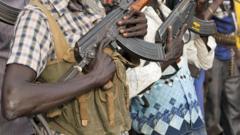The UN warns that escalating tensions and violence in South Sudan could lead to another civil war, jeopardizing years of fragile peace efforts.
Escalating Violence in South Sudan Raises Concerns of Civil War

Escalating Violence in South Sudan Raises Concerns of Civil War
Airstrikes using barrel bombs prompt fears of renewed conflict in the world's newest nation.
In a troubling development, the United Nations has raised alarms about the potential eruption of civil war in South Sudan as recent airstrikes reportedly utilizing barrel bombs have been deployed. These strikes, believed to contain a highly flammable substance, were noted by Nicholas Haysom, head of the UN mission in South Sudan, amidst escalating clashes between the national army and the rebel group known as the White Army.
The situation intensified after the White Army captured a military base in Nasir, located in the oil-rich Upper Nile State. Haysom reported that the consequent aerial bombardments resulted in "significant casualties and horrific burns" among civilians. He underscored the grim reality that a renewed conflict could undo the progress made since the peace agreement of 2018, which had aimed to end a civil war that left nearly 400,000 dead.
The relationship between President Salva Kiir and Vice-President Riek Machar, whose alliance was pivotal in brokering the peace deal, has deteriorated significantly, revealing deep-rooted ethnic tensions and sporadic violent encounters. Just recently, the arrest of key allies of Machar by security forces has further strained the fragile peace, with supporters calling it a serious breach of the agreement.
Local leaders in Upper Nile have accused government forces of utilizing "chemical bombardments," leading to fears of indiscriminate violence against communities. Reports of ethyl acetate, a highly combustible compound, have surfaced from attack sites, alleging its use in these military operations against the White Army. The government, on the other hand, has dismissed such accusations, claiming that their operations exclusively targeted military objectives and avoided civilian harm.
Haysom, however, has emphasized the adverse impact of these operations on civilians, highlighting that about 63,000 people have been displaced amid fears of rising violence as elections approach in the near future. He also warned about the rising tide of misinformation and hate speech, which could further inflame ethnic divisions within the nation.
In a related note, Riek Machar has accused neighboring Uganda of breaching the UN arms embargo by carrying out airstrikes in South Sudan. Machar's letter to the UN and African Union alleged that Ugandan forces participated in strikes against civilian targets in several states, marking a concerning escalation in regional tensions. Uganda has purportedly deployed troops at the request of Kiir's government, although Juba has denied this claim.
The UN mission, which supervises around 18,000 peacekeepers in South Sudan, is currently engaged in urgent diplomatic efforts to stave off the impending threat of civil war. The fragile peace of South Sudan, the world's newest country, hangs in the balance as violence escalates and the political landscape grows increasingly tumultuous.
The situation intensified after the White Army captured a military base in Nasir, located in the oil-rich Upper Nile State. Haysom reported that the consequent aerial bombardments resulted in "significant casualties and horrific burns" among civilians. He underscored the grim reality that a renewed conflict could undo the progress made since the peace agreement of 2018, which had aimed to end a civil war that left nearly 400,000 dead.
The relationship between President Salva Kiir and Vice-President Riek Machar, whose alliance was pivotal in brokering the peace deal, has deteriorated significantly, revealing deep-rooted ethnic tensions and sporadic violent encounters. Just recently, the arrest of key allies of Machar by security forces has further strained the fragile peace, with supporters calling it a serious breach of the agreement.
Local leaders in Upper Nile have accused government forces of utilizing "chemical bombardments," leading to fears of indiscriminate violence against communities. Reports of ethyl acetate, a highly combustible compound, have surfaced from attack sites, alleging its use in these military operations against the White Army. The government, on the other hand, has dismissed such accusations, claiming that their operations exclusively targeted military objectives and avoided civilian harm.
Haysom, however, has emphasized the adverse impact of these operations on civilians, highlighting that about 63,000 people have been displaced amid fears of rising violence as elections approach in the near future. He also warned about the rising tide of misinformation and hate speech, which could further inflame ethnic divisions within the nation.
In a related note, Riek Machar has accused neighboring Uganda of breaching the UN arms embargo by carrying out airstrikes in South Sudan. Machar's letter to the UN and African Union alleged that Ugandan forces participated in strikes against civilian targets in several states, marking a concerning escalation in regional tensions. Uganda has purportedly deployed troops at the request of Kiir's government, although Juba has denied this claim.
The UN mission, which supervises around 18,000 peacekeepers in South Sudan, is currently engaged in urgent diplomatic efforts to stave off the impending threat of civil war. The fragile peace of South Sudan, the world's newest country, hangs in the balance as violence escalates and the political landscape grows increasingly tumultuous.






















